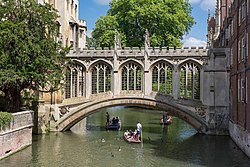Bridge of Sighs | |
|---|---|
 View of the bridge taken from the Kitchen Bridge in 2014 | |
| Coordinates | 52°12′30.33″N000°06′56.76″E / 52.2084250°N 0.1157667°E |
| Crosses | River Cam |
| Locale | St John's College, Cambridge, Cambridge, United Kingdom |
| Official name | New Court Bridge [1] |
| Preceded by | Kitchen Bridge |
| Followed by | Magdalene Bridge |
| Characteristics | |
| Design | Covered arch bridge |
| Material | Stone |
| No. of spans | One |
| History | |
| Architect | Henry Hutchinson |
| Construction end | 1831 [2] |
| Location | |
 | |
The Bridge of Sighs in Cambridge, England is a stone covered bridge at St John's College, Cambridge, England. It was built in 1831 and crosses the River Cam between the college's Third Court and New Court. The architect was Henry Hutchinson. [3] [4] It is named after the Bridge of Sighs in Venice, [5] although they have little architecturally in common beyond the fact that they are both covered bridges with arched bases. The bridge, a Grade I listed building, [4] is a Cambridge attraction and Queen Victoria is said to have loved it more than any other spot in the city. [6]


